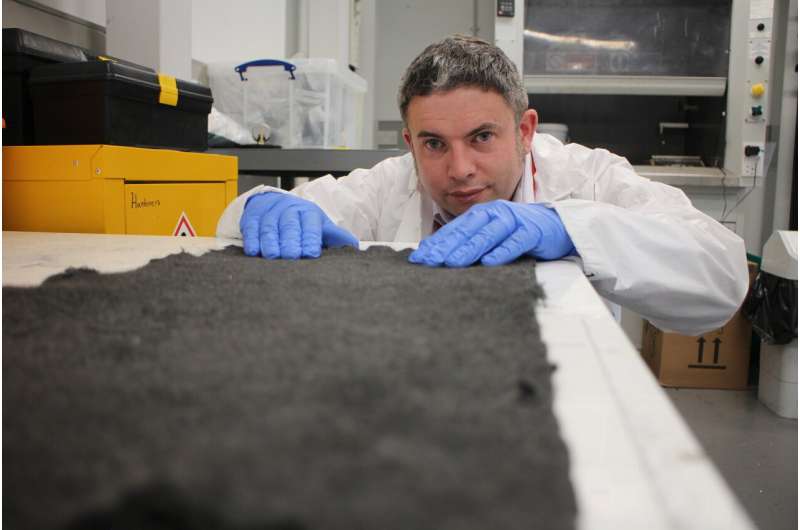#Electric vehicles could be powered by hydrogen harvested from sewage

“#Electric vehicles could be powered by hydrogen harvested from sewage”

Wastewater treatment is vital to remove pathogens, but is incredibly energy intensive. The ability to treat it more sustainably is a challenge researchers from WMG, University of Warwick have been able to achieve, using recycled carbon fiber mats to produce hydrogen from waste water.
Treating wastewater is a vital process, as it removes pathogens and protects the environment, however this comes at its own environmental cost, as it is highly energy intensive, using around 3% of energy use in the UK—the equivalent to 13 billion kilowatt hours.
The water and waste company Severn Trent set researchers from WMG, University of Warwick, the challenge of finding a more energy efficient way to treat wastewater, with the team successfully building on research into Microbial Electrolysis Cells.
Microbial Electrolysis Cells involves using electromagnetic microorganisms to break down organic pollutants in waste water, producing clean water and hydrogen gas. The ability to produce Hydrogen gas is valuable in itself as it can be sold to chemical and plastics industry, or for use in hydrogen fuel cells for energy storage or electric vehicles.
Although this all sounds promising it hasn’t been developed on an industrial scale, as the anode materials—which are used in the reaction to breakdown the organic pollutants—are made of graphite or carbon, and cost several hundred pounds per square meter, and produce low rates for Hydrogen.
Dr. Stuart Coles and his team therefore took on the challenge of refining the technique by looking at alternative anode materials and processing methods, and successfully identified recycled carbon fiber mats as an alternative anode, which costs only £2 per square meter, making it significantly cheaper than existing anode materials.
After testing the carbon fiber mats on synthetic wastewater and real wastewater, researchers found the bacteria developed on the recycled carbon fiber anode, which had better temperature tolerance and produced more hydrogen than previously used materials.
They then decided to pilot their techniques at Severn Trent’s Minworth waste treatment site, where they successfully processed up to 100 liters of wastewater per day and managed to remove 51% of organic pollutants and up to 100% of suspended solids from the water while producing 18 times more hydrogen (at 100% purity) than the graphite material.
Dr. Stuart Coles, from WMG, University of Warwick comments:
“We are really excited about this technology. By taking waste from the automotive and aerospace sectors, we have developed a circular solution to a longstanding problem. Instead of just treating the wastewater, we are now able to extract value from it in the form of hydrogen at a lower cost than ever before.
“The next phase of this work is look at optimizing the design of the microbial electrolysis cells and further reduce the level of pollutants in the water. This in turn should help produce even more hydrogen.”
Bob Stear, Chief Engineer at Severn Trent adds:
“The performance boost and cost savings demonstrated from this research mean that MEC technology is one step closer to being cost competitive with existing wastewater treatment assets. WMG have also demonstrated that this technology has the potential to create a more circular wastewater treatment process which will be essential to delivering on our long term sustainability goals and Net Zero plans. We’re currently scoping scaling up the technology at our test-bed plant in Redditch.”
Citation:
Electric vehicles could be powered by hydrogen harvested from sewage (2021, November 2)
retrieved 2 November 2021
from https://techxplore.com/news/2021-11-electric-vehicles-powered-hydrogen-harvested.html
This document is subject to copyright. Apart from any fair dealing for the purpose of private study or research, no
part may be reproduced without the written permission. The content is provided for information purposes only.
If you liked the article, do not forget to share it with your friends. Follow us on Google News too, click on the star and choose us from your favorites.
For forums sites go to Forum.BuradaBiliyorum.Com
If you want to read more Like this articles, you can visit our Science category.



